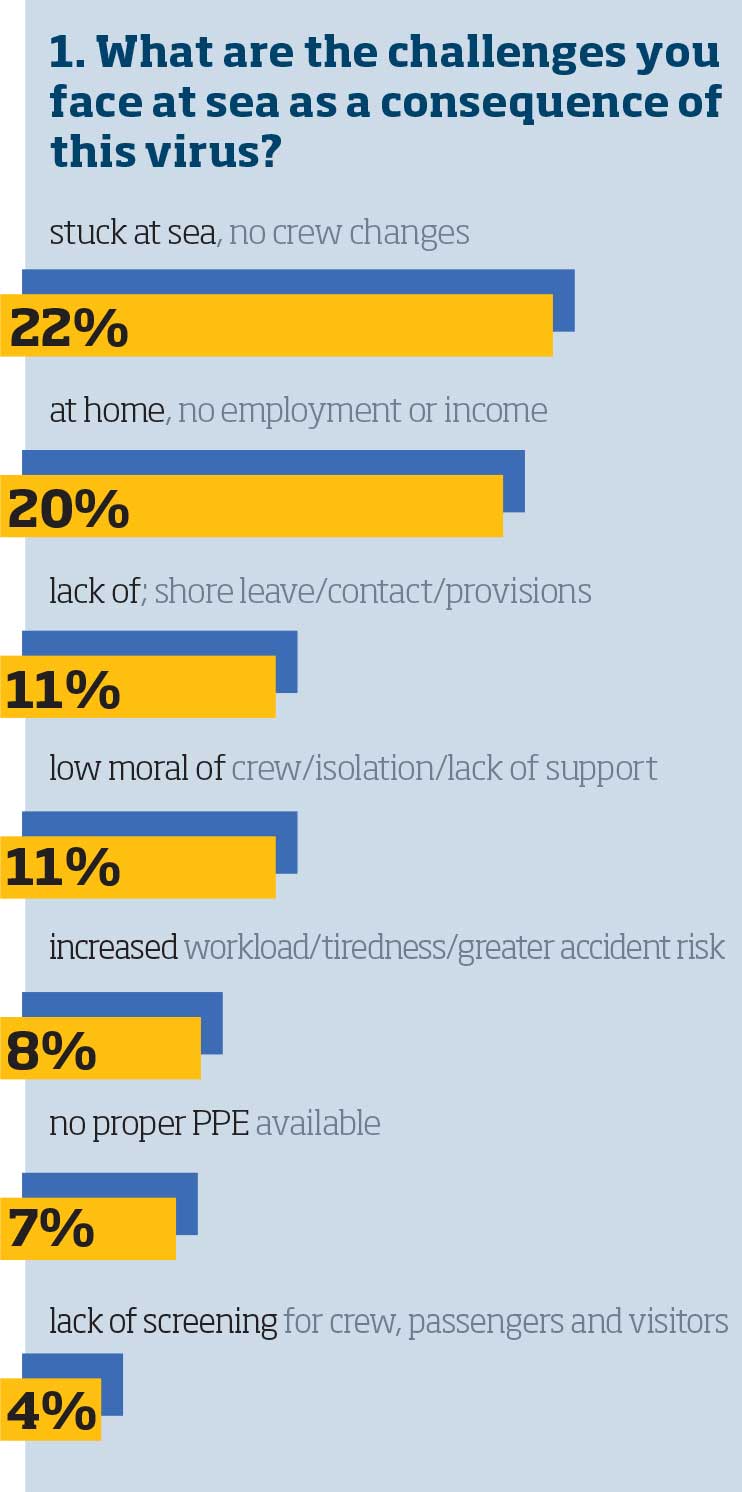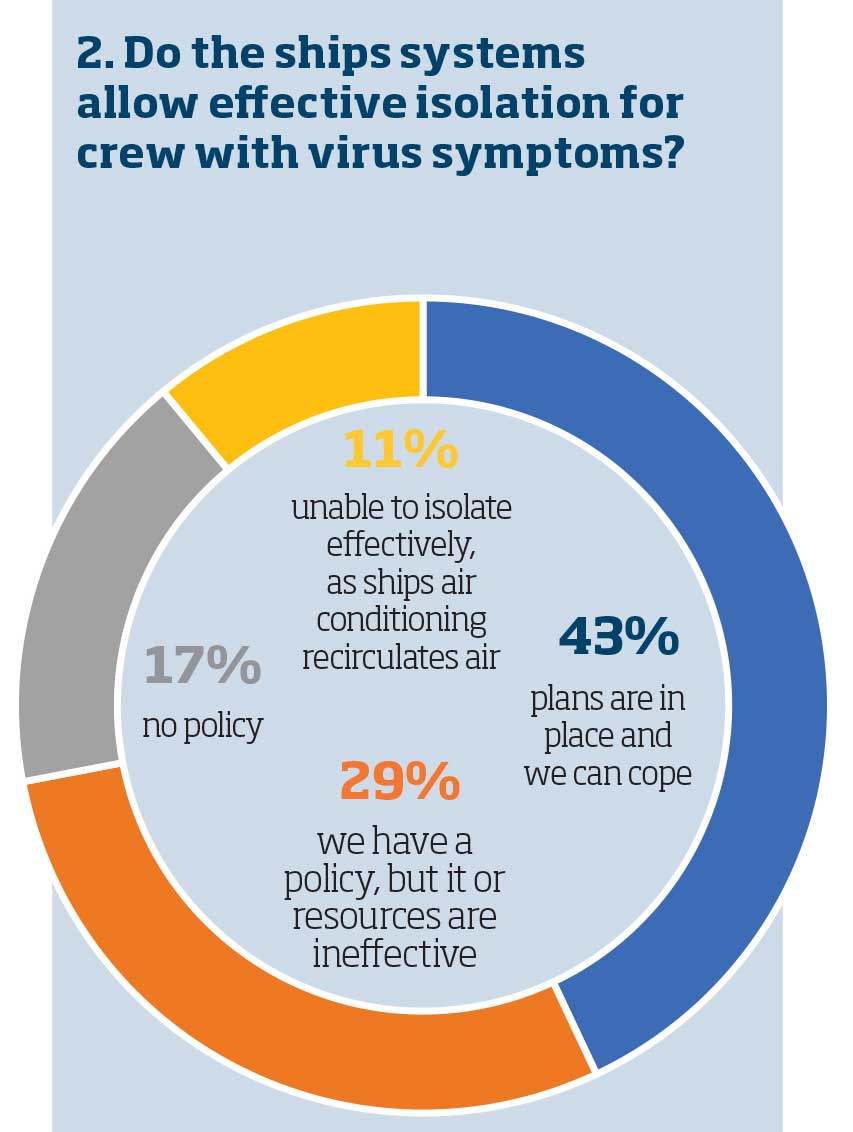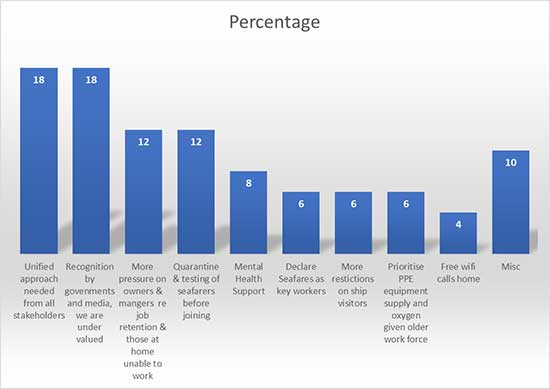- Topics
- Campaigning
- Careers
- Colleges
- Community
- Education and training
- Environment
- Equality
- Federation
- General secretary message
- Government
- Health and safety
- History
- Industrial
- International
- Law
- Members at work
- Nautilus news
- Nautilus partnerships
- Netherlands
- Open days
- Opinion
- Organising
- Podcasts from Nautilus
- Sponsored content
- Switzerland
- Technology
- Ukraine
- United Kingdom
- Welfare

Honourable Company of Master Mariners survey reveals two distinct groups of seafarers being carved out from the coronavirus pandemic – those who are stuck at sea and forced to suffer extended separation from family, and those whose jobs are now at risk with little or no financial support from employers or government. Both groups are dealing with considerable stress and facing an uncertain future
Honourable Company of Master Mariners survey reveals two distinct groups of seafarers being carved out from the coronavirus pandemic – those who are stuck at sea and forced to suffer extended separation from family, and those whose jobs are now at risk with little or no financial support from employers or government. Both groups are dealing with considerable stress and facing an uncertain future
It is clear from the many heartfelt comments to the HCMM survey, that most seafarers are concerned at the significantly extended separation from their families, and once they return home an apparent lack of financial support by their employers, or an understanding of their plight by the media, HCMM clerk Commodore Angus Menzies said in his analysis of the results.
Communicating feedback on progress is vital to giving the assurance to seafarers they need right now, and to help them to deal with the isolation, and mental health challenges they face, both at sea, and at home.
The number of responses from seafarers at home and unpaid highlights a significant issue for key workers that needs addressing by the UK government. Long term solutions are also required by employers, if they want to retain their investment in well trained, experienced, and professional staff. The logic and need of key worker status for seafarers, to enable crew changes to take place, and to give seafarers the protection they need and deserve, is clear from this survey.
A by-product of all these issues is the increased workload and tiredness being faced, which has been flagged as a potential risk of increased accidents by respondents.
Although 43% of respondents confirmed their companies have protection policies in place, they believe can cope with Covid -19, the other 57% of respondents are on ships with policies they believe are either ineffective, or on ships with no policy at all.

The limitations placed on crew because of group confinement onboard ships at sea, means that the combination of most ship designs and management systems, are unable to provide them with the protection they need during a pandemic.
In an ever integrated and connected world, likely to create the risk of more rather than less pandemics, future ships systems need to be designed to minimise the risks of cross contamination, ships staff need training and resources. Leadership and management systems need to be tested to make sure they are sufficiently robust.
Many British seafarers serve on foreign flag vessels. This needs to be considered when formulating approaches and policy relating to this survey. Statements from members that serve as pilots, have included the challenges of working on many different ships in a day with differing ideas of what constitutes 'social distancing'. Pilots boarding vessels that have not declared at risk from infection, when it has been established that they are, increases the risk to UK pilots, and the risk of them unknowingly transferring the virus to all the other ships they visit.
The feedback of appreciation of this survey and the #keepingbritainafloat campaign, underlines the importance of our continued engagement and follow up, with, and for, seafarers.
Communicating feedback on progress is vital to giving the assurance to seafarers they need right now, and to help them to deal with the isolation, and mental health challenges they face, both at sea, and at home
Method
In late March the Honourable Company of Master Mariners (HCMM) surveyed members, some of whom are also Nautilus members, to identify the issues and concerns flowing from the Covid-19 crisis. The aim was to provide members with support and to allow HCMM to engage with and inform debate with interested stakeholder groups in the maritime sector.
The questions asked were:
- What are the challenges you face at sea as a consequence of this virus?
- Do the ships systems allow effective isolation for crew with virus symptoms?
- What are the issues with crew changes?
- Are your ships still able to obtain stores and food?
- What else should the industry do to protect you?
- What other issues would you like to share with HCMM
Sixty responses to the survey were received from what was a short notice initiative, providing a strongly representative sample of the issues seafarers currently face.
Covid-19 has created a very fast moving and turbulent situation, and much continues to change. However, taking this into account, HCMM believes it has been able to provide an accurate snapshot of the issues.
Data and Results
1. What are the challenges you face at sea as a consequence of this virus?
The feedback from respondents indicate that 40% are concerned and stressed, as they are either stuck at sea with no crew change in sight, or at home without employment or income. The responses highlight the worrying challenges and concerns that HCMM members face.

Other comments that stood out in terms of the serious issues and frustrations faced include:
- In general morale on board is pretty low
- Most seriously, the appalling occupational health of many UK seafarers means that they are at high risk
- We have been advised to implement barrier nursing. The Ships Captain's Medical Guide does not even mention it. Though Master and Chief Mate have been trained, no one else has
- Increased workload, little practical support, threat of job losses
- Stuck in limbo! I am studying for my Officer of the Watch (OOW) and was due to finish my exams this week and MCA oral by May. All on hold now that colleges are closed.
2. Do the ships systems allow effective isolation for crew with virus symptoms?
It was clear from the comments that several the responses came from passenger ships and ferries. Despite having protection policies in place, in many circumstances they are unable to cope with the societal challenges and limitations placed on crew because of group confinement onboard ships at sea.
Of those that responded 43% had plans in place that gave them the comfort that they felt they could cope, 29% had policies or resources that respondents believed were ineffective, 17% said there was no policy, and 11% were unable to isolate due to ships air conditioning systems recirculating the air.
This means that 57% of respondents were on ships with policies that are ineffective or without a policy at all.

Other comments included:
- I work for Trinity House and believe they have a robust plan in place if anyone shows symptoms onboard
- We are isolated in a cabin and have regular temperature checks carried out by the ships nurse
- We have a standard cruise ship policy regarding infectious disease, however Covid spreads rapidly before anyone even shows symptoms
- If one person becomes sick, it is highly likely that all persons on board will also become sick, due to the closed nature of a ship's accommodation
- If someone is showing symptoms, that person is isolated within their cabin and landed at next port. Afterwards their cabin is disinfected
- Ship is too small for self-isolation. Only the Masters' cabin does not have to share a bathroom. Many cabins only source of ventilation is through ships forced air
- We have a procedure for isolation. However, I would argue that isolation onboard any vessel is almost impossible as the air conditioning system recirculates shared air around the whole accommodation space
3. What are the issues with crew changes?
At the time of the survey 83% of respondents said crew changes had been stopped. Of those that said crew changes were still taking place, many were involved in UK / home trade or offshore activities.
While the results to this question seem straightforward, the responses flag issues that need to be addressed and included:
- Impossible now due to cancellations of flights, the company are wanting to protect crews and vessels against the virus and are limiting crew change for this reason. Hopefully flights resume and borders open so crew can be changed
- Seafarers face country restrictions. We need to be treated same as airline staff to enable crew changes to take place
- Different country restrictions making it difficult for mixed EU/UK offshore vessels to change crew
- Even if we can get crew to the ship and other crew home, the subsequent ports will ban the vessel from entering and apply a 14-day quarantine period.
4. Are your ships still able to obtain stores and food?
The answer here was 100% yes, with some clarifications:
- Many ports a political nightmare regarding a lot of extra paperwork
- Some restrictions such as fresh food and medical supplies
- Becoming more and more difficult
- Involved in local trade, Master given cash to shop at supermarket, had goods taken out of trolley by other shoppers, whom mistook him for a food hoarder.
5. What else should the industry do to protect you?
Because of this type of question, the responses were more diverse. Irrespective of the percentage scoring, all the issues raised are important and deserve our support.

The two main issues that together equate to 36%, highlight the need for a unified approach by all stakeholder groups (ship owners, managers, flag, and ports) towards dealing with the problem, and recognition by government and media that seafarers are undervalued.
They flag job retention, as a big concern, especially for those stuck at home unable to work. HCMM respondents also flag the need to quarantine and test seafarers, before they join ships, so as not to put existing crew members onboard at risk.
6. What other issues would you like to share with HCMM?
As this type of question stimulates a diverse range of answers, there is no one answer that stands out.

The following capture the issues.
There has been feedback thanking us for our efforts to help seafarers and raise these issues to stakeholders:
- Great idea to collate the experience of members. Hopefully the industry and those in power take note
- The #keepingbritainafloat is a great idea but the reality is most British vessels are British in flag only and not crew
- Keep up the social media campaign, I have set the 'I'm at sea' picture as my cover photo on Facebook which has received a surprising number of shares so far
- The general response by my crew is impressive in rising to the challenges, we just need to protect ourselves and keep working
- It is good to see the Merchant Navy doing what it does and hopefully we can be appreciated more after this is all over. Thanks to the HCMM for promoting the MN.
Short term issues regarding Covid-19 that needed to be solved include:
- We appreciate the vital importance of our role, please give us the PPE equipment so we can do our duties effectively and safely
- I am at home on leave without pay. My employer is protected but I am not
- It is not only the crew on board that are suffering. Families are also finding it difficult, not knowing when their husband/ father is coming home. And those that are at home are concerned at their future without any salary coming in, with no recourse to their plight
- Our ageing and therefore particularly vulnerable workforce have inadequate protection (we only have one in six ratings under the age of sixty)
- Shore leave has been stopped. I see no difference between someone isolated in their home going for their daily exercise ashore and myself. If social distancing measures are kept in place, seafarers should still be allowed their right to shore leave.
Many respondents flagged the need for long-term changes to the maritime industry:
- Fatigue does not go away in a crisis, this and stress need dealing with, greater risk of accidents
- British shipping is highly dependent upon outsourced labour, current issues highlight these risks
- There is currently no safety net for seafarers who are on 'pay whilst at sea' contracts. These should be banned to give seafarers more financial security whilst on leave. I do not know when I will be going back on board and there is no financial assistance/support from my company written into the SEA contract in the event of a seafarer not being able to return to a vessel due to events out of their control
- The UK and the world must understand that stopping ship's crew and technicians from moving will make an already challenging environment more difficult, and something much worse (will happen as this restriction) will hamper the free movement of goods and energy.
Tags
More articles
Nautilus FAQs on Covid-19 Coronavirus
Seafarers – our keyworker beacons in a global emergency
Seafarer 'travel certificates' launched
Seafarers can now be issued with certificates confirming their keyworker status as transport workers and certifying they be allowed free passage to travel between their home and vessel during the coronavirus pandemic.
A voice from the maritime community: 'Pay attention to seafarers now or regret it when pandemic shortages bite'
'Overburdened with obsolete knowledge' – seafarers' opinions of STCW in the SkillSea project
A son's story of a father stranded onboard a vital ship in the global supply chain
Like many Nautilus International members, containership chief officer Chris Kuiken should have been relieved from his ship with a crew change a long time ago.
